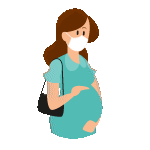Along with the joy and excitement, pregnancy also brings some discomfort due to changes in hormones. One of the most common conditions that is experienced by a majority of women, especially during the first trimester of pregnancy, is morning sickness. A combination of nausea and vomiting, morning sickness can continue until the 16th week of pregnancy in some cases.
We have made a thorough guide for you to understand everything about morning sickness and how to deal with it.
What is Morning Sickness?
Contrary to its name, morning sickness is not just limited to the morning. It can strike at any time, during the day or night. For many women, it starts around the fourth week of pregnancy. However, some women experience morning sickness in their second trimester or the entire pregnancy, with unfortunate nausea and vomiting.
Morning sickness isn’t harmful, and it doesn’t harm the unborn child or woman, but if there are any serious symptoms, then it is important to seek prompt medical consultation and treatment.
Common Symptoms
Here are the common symptoms that are commonly experienced during morning sickness:
- Nausea and vomiting triggered by odour, especially food
- The body produces excessive saliva
- Feeling exhausted even after a good night's sleep
- Waking up tired and dizzy
- Vomiting, even without any odour triggers
Very rarely, morning sickness can become a more serious condition called hyperemesis gravidarum. This condition involves experiencing severe symptoms of morning sickness, including weight loss and severe vomiting, dehydration, darker urine than usual, an increased heart rate, and more. These are the signs that your body is getting dehydrated and your health is being affected. In such cases, without wasting time, consult your doctor and get the right treatment.
What Causes Morning Sickness?
Many doctors believe that morning sickness happens because of changes in hormones. The pregnancy hormone increases in the morning, reaching its highest level. Pregnancy also makes it difficult to digest food, leading to stomach complaints and overall health issues leading to morning sickness. Different women are affected in different ways by morning sickness, which can include:
- Fluctuation in blood pressure
- Drop in blood sugar
- Increase in stress levels
- A heightened state of anxiety
How Do You Prevent Morning Sickness?
While there is no one-size-fits-all solution for morning sickness, the following strategies can ease symptoms and make the experience more manageable:
- Eat smaller meals throughout the day to not feel queasy, because having an empty stomach for too long can make you feel sick.
- Avoid food that triggers nausea with its odour or taste.
- Eat foods that are bland and easy to process, like bananas and rice.
- Drink lots of liquid to stay hydrated and to maintain the nutrients you may lose from vomiting.
- Try to consume ginger, as it may calm the feeling of nausea. The easiest option is drinking ginger tea.
- Keep a record of morning sickness to track the symptoms and find out what needs to be avoided.
- Go for a walk in nature for a refreshing feeling.
- Some women find great relief with acupressure or acupuncture on the wrist.
- Avoid any supplement or medicine without a prescription from your healthcare provider.
When do you see your doctor?
Your severe symptoms can be different from those of someone else. While there are safe and easy ways to manage the symptoms of morning sickness by yourself, it doesn’t work for everyone. More persistent symptoms may require other solutions. It is always a good idea to seek medical assistance when your symptoms become severe and you are no longer able to manage them.
Here are some signs that are not common and may require you to get medical help:
- No urine or only a little urine, dark in colour
- Frequent vomiting after consuming liquid
- Constantly feeling dizzy when you stand up
- Severe nausea within the second trimester
- Abdominal pain
- Spotting or bleeding
Morning sickness is challenging and unavoidable, but it’s also a sign of a life growing inside you. Your body is doing what it needs to support your growing baby. The best you can do is follow your doctor's advice carefully, use some of the above tips, and be happy. Also, if you don’t experience morning sickness, there isn’t anything wrong with you. Just be sure to inform your doctor about any strange or new symptoms you may notice. Do not consume anything without your doctor's advice.
FAQ's
Q. What is morning sickness during pregnancy?
Ans.Morning sickness is a common pregnancy symptom involving nausea and vomiting. Despite the name, it can occur at any time of day. It usually starts in the first trimester and often fades by the 16th week, though some women may experience it throughout pregnancy.
Q. When does morning sickness usually start?
Ans.Morning sickness typically begins around the 4th week of pregnancy. For many women, it lasts until the end of the first trimester, but it can sometimes continue into the second trimester or, in rare cases, last the entire pregnancy.
Q. Is morning sickness harmful to the baby?
Ans.In most cases, morning sickness isn’t harmful to the baby or mother. However, if symptoms are severe, like excessive vomiting or dehydration, it’s important to consult a doctor to rule out conditions like hyperemesis gravidarum and ensure proper care.
Q. What causes morning sickness?
Ans.Morning sickness is largely triggered by hormonal changes in pregnancy, especially increased levels of hCG. It may also be influenced by low blood sugar, stress, fatigue, and heightened sensitivity to smells and tastes that trigger nausea.
Q. What are common symptoms of morning sickness?
Ans.Common symptoms include nausea, vomiting, increased saliva, fatigue, dizziness, and sensitivity to smells. Some women may vomit without any apparent triggers. If symptoms are severe, it could indicate hyperemesis gravidarum and require medical attention.
Q. How can I manage or prevent morning sickness naturally?
Ans.Eat small meals throughout the day, avoid trigger foods, stay hydrated, and try bland foods like bananas and rice. Ginger tea, acupressure, and walking in fresh air may also help ease nausea and prevent symptoms from worsening.
Q. Can ginger really help with nausea during pregnancy?
Ans.Yes, ginger has been shown to help reduce nausea in pregnant women. You can consume it as tea or add it in small amounts to your meals. Always consult your doctor before using herbal remedies regularly.
Q. What is hyperemesis gravidarum?
Ans.Hyperemesis gravidarum is a severe form of morning sickness involving persistent nausea, vomiting, weight loss, and dehydration. It can lead to complications if untreated, and medical intervention is necessary for proper hydration and nutrition.
Q. When should I see a doctor for morning sickness?
Ans.See a doctor if you have dark or little urine, frequent vomiting, dizziness, or can’t keep fluids down. Also, seek help if nausea continues into the second trimester or you notice abdominal pain or spotting.
Q. Is it normal to not have morning sickness at all?
Ans.Yes, not all women experience morning sickness. Every pregnancy is different, and the absence of nausea doesn’t indicate a problem. However, it's always best to keep your doctor informed about your symptoms for reassurance and guidance.




















